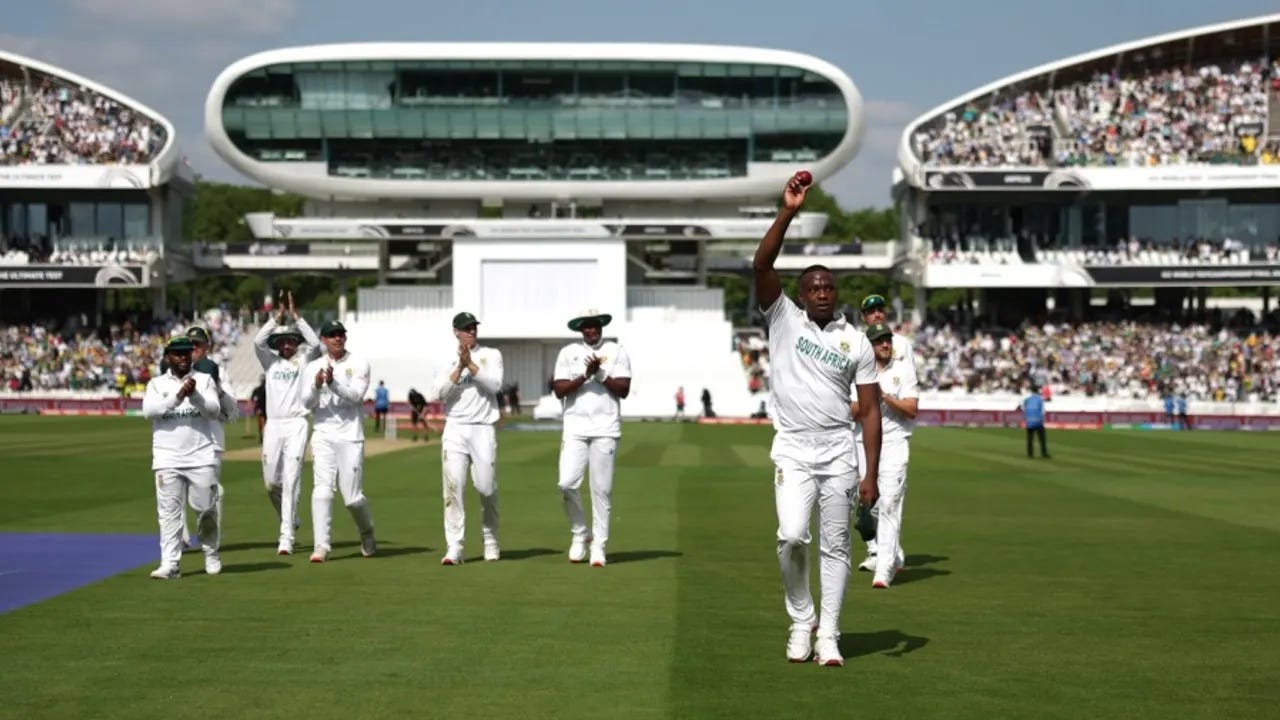Kagiso Rabada did not spread his arms like wings or punch the air with joy. There were no celebrations because Rabada did not take a wicket, but he did a good job. His captain gave him six overs up front, and the pacer conceded a mere 20 runs at an economy of 3.3 runs an over.
It’s not often that Rabada walks away from a match without a scalp, but it happened when the Gauteng u15 side faced off with Free State u15s at the ABSA Oval at Nelson Mandela University in 2010. It wasn’t an isolated incident, but a regular occurrence back then.
According to numerous former teammates, at school and provincial level, Rabada was too good for his age-mates. Though they were still in their nascent stage, his pace, bounce, and movement troubled teenage batters. Rabada beat the outside edge more times than they could remember. Those who could, saw off his overs, and those who couldn’t prayed their way through them.
Kagiso Rabada suffered his first major heartbreak when he was 13. He missed out on both the Gauteng u13A cricket and the Golden Lions Rugby teams. Instead, he made the Gauteng u13B cricket side. For someone as competitive as Rabada, ‘who tried to get into every ruck and tried to tackle everyone’ in rugby matches, that was a low point.
It was also the last time he wasn’t one of the best bowlers on the pitch over the next 17 years. After that incident, he put his head down, rolled his sleeves and went to work. Instead of relying on his natural athletic abilities, Rabada focused on the technical side of his bowling and paid closer attention to his conditioning requirements.
He became a staple in representative provincial sides and played his first semi-professional match for Gauteng Strikers five years later. He foreshadowed what he would do in his career with 3/28 in 15 overs in his maiden red-ball innings for Gauteng strikers and took at least a single wicket in all of his matches for them. He was promoted to the Lions shortly afterwards, and he bagged wickets in his 2013-14 season appearances for them.
“The bottom line is, if you're a bowler, try to bowl a good line and length; as a batter, it's about keeping the good ball out and scoring off it or scoring off balls that are not quite there and missed executions from the bowler. That's the bottom line. So everything else is just noise,” he shared after his 17th Test five-wicket haul in 2025.
Rabada shared that wisdom at the ripe age of 30, but had been living it in the decade he has been in international cricket. It is the reason why Rabada has taken at least one wicket in all Tests he has played in except one, a washed-out affair that barely lasted 70 overs. If that is not impressive, how about this for size: Rabada takes five-wicket hauls at a higher rate than the times he goes wicketless.
He has failed to take a wicket in 12 of the 130 innings he has bowled in red-ball cricket, but has taken a five-fer in 17. Here is another way of looking at it: Rabada takes a five-wicket haul every 7.6 innings. That is not a bad frequency; it is close to Dale Steyn and Allan Donald’s elite rates of 6.5 and 6.45.
Rabada’s ability to take five-wicket hauls was much closer to Steyn and Donald’s when he was part of a much stronger bowling attack. From November 2015, his debut, to December 2018, Rabada bowled in a pace attack with Steyn, Morne Morkel, and Vernon Philander, which also featured Kyle Abbott, Duanne Olivier, and Chris Morris. Rabada bagged nine five-wicket hauls in 61 innings at 6.7.
Stronger bowling attacks translate to longer periods of sustained pressure and higher chances of good balls resulting in wickets. Conversely, weaker bowling attacks provide batting lineups with breathing room. Since 2019, Rabada has had to work with a slightly lighter attack and has had to carry the team on his shoulders at certain points. He took eight five-wicket hauls in 69 innings at 8.6.
His 5/51 against Australia in the World Test Championship final leaves him one five-wicket haul behind Makhaya Ntini, who amassed 18 five-fers in his 11-year Test career. He is also three five-wicket hauls adrift of Allan Donald, who finished his career with 20. Both are in touching distance for Rabada, the big question is, will he have a career long enough for him to reach Dale Steyn’s 26?
Time will tell. But, whether he gets there or not, one thing is guaranteed: Rabada creates theatre with the ball in hand. He tests batters with his pace, bounce, and movement in Tests, just as he did as a teenager.





